Give ’em credit for not giving up.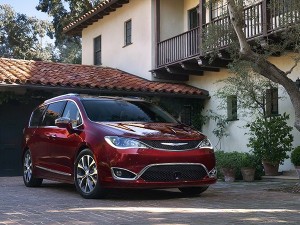
Chrysler – the company that invented the things – is the last of the Big Three to still have a minivan in its lineup. GM and Ford long ago said to hell with it – ceding this market to the Japanese (and Koreans).
Which the Honda Odyssey and Toyota Sienna pretty much own now, as a result – with the Kia Sedona and Nissan Quest cleaning up most of the scraps.
So it’s brave, at the very least for, Chrysler to even stay in the game. And downright courageous of them to bring out a brand-new van, with all the resources that took – and all the prestige that’s now on the line.
It even has a new name – Pacifica.
The Pacifica is Chrysler’s replacement for the Town & Country, which has officially ceased to exist.
Like the T&C, the Pacifica is a traditional, full-size (and not-so-mini) van.
Like the Honda Odyssey and Toyota Sienna – the Pacifica’s primary rivals – the emphasis is on luxury and technology at least as much as utility.
Also like them, it’s a big galoot.
Bigger, in fact, than both the Odyssey and the Sienna – which are “mini” vans like Donald Trump is an introvert.
You could live – comfortably – in any of them.
Prices for the Pacifica start at $28,595 for the LX trim, with seating for seven. This can be increased to eight by ordering an optionally available (and removable) second-row center seat.
There are also Touring, Touring L, Touring Plus and Limited trims – the latter including a built-in vacuum cleaner, 20-inch wheels and two sunroofs: a sliding panorama roof plus a fixed rear glass section, kind of like a ’70s-era Oldsmobile Vista Cruiser station wagon had.
No big V8, though.
MSRP for the Limited is $42,495.
The Pacifica’s main rivals, the Sienna and Odyssey, start at $28,850 and $29,400 respectively – topping out at $46,410 and $44,875.
A plug-in hybrid variant of the Pacifica is on deck for later this fall or spring 2017. Chrysler says it will be able to travel about 30 miles at normal road speeds on battery power alone.
Neat, in terms of the tech.
But the price (not officially available when this review was written in late August) is likely to be high vs. whatever savings you achieve at the pump.
WHAT’S NEW
Everything – including the name.
Available rear-seat entertainment system includes two 10-inch Blu-Ray monitors built into the driver and front seat backs.
Easily removable second row center seat adds (or subtracts) passenger/cargo capacity, as needed.
Can tow 100 lbs. more than Sienna and Odyssey (3,600 lbs., max – vs. 3,500 lbs.).
If you ever wanted an Airstream but have been put off by the price, here’s something similar – for less – that doesn’t need a truck to pull it around.
WHAT’S NOT SO GOOD
Equipped with Airstream-esque features, these things come with near-Aistream MSRPs.
Adaptive cruise control sometimes struggles to keep set speed on downhill grades.
Much wider turning circle (39.7 feet) than either Odyssey (35.1 feet) or Sienna (37.5 feet).
The Pacifica comes standard with a slightly larger – and slightly stronger – V6 engine than either of its two main rivals, the Sienna and Odyssey: 3.6 liters and 287 hp vs. 3.5 liters and 266 hp in theToyota and 3.5 liters, 248hp in the Honda.
The Chrysler also comes with a nine-speed automatic vs. the six speed automatics in the Sienna and Odyssey.
But it works out pretty much the same.
These vans all get to 60 in the mid-high seven second range – runs that are in the same time slot as sporty cars like a Mazda6 sedan.
But unlike a Mazda6, the mileage sucks.
Of the three, the Toyota’s is – surprisingly – the worst: 18 city, 25 highway. 16 city, 23 with the optional AWD. Which is probably why the others don’t even offer AWD.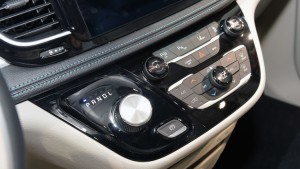
The Pacifica comes in second – 18 city, 28 highway – also surprising, given it has the leverage leg up of nine forward speeds, three more than its rivals.
It ought to have the advantage.
Even so, the Odyssey squeaks by (though just barely) to the number one slot: 19 city, 28 highway.
All these vans cry out for diesel power.
And diesel mileage.
Instead – because Uncle – we get inefficient gas engines and (in the Pacifica) expensive hybrid drivetrains.
A diesel engine would make so much more sense in these heavy, not-very-mini-vans. The diesel’s superior low speed torque would get them going better, with much better efficiency – and for a much better price than the technologically interesting but economically demented hybrid set-up.
Yeah, you can go as far as 30 miles at normal road speeds without burning – or paying for – a drop of gas.
But how much did you pay the dealer to get the fancy hybrid powertrain?
Chrysler hasn’t spilled any beans yet, MSRP-wise – but plug-in hybrids are always more expensive than regular hybrids – because of their higher-performance battery packs and additional gear, including more powerful electric motors (necessary to move the vehicle at more than the usual crawl).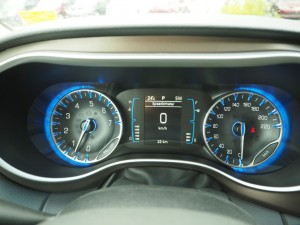
The last time Toyota sold a plug-in version of the popular Prius hybrid back in 2015, it cost about $32,000 vs. about $24,000 for the standard-issue (no plug-in capability) Prius. Which is probably why there is currently no plug-in version of the Prius hybrid. The cost-to-benefit ratio isn’t favorable.
Especially when regular unleaded is only about $2 a gallon.
For the same reasons, the hybrid Pacifica is likely to be a tough sell, too.
You’ll also pay another way.
The otherwise standard second row Stow and Go seating that lets you “disappear” the second row seats into the floor, leaving a flat surface you can use to sleep on or load stuff on is nixed in the hybrid because of the battery pack – which takes up the space under the floor where the seats would otherwise Stow and Go.
From the driver’s point of view, this not-so-mini-van doesn’t feel as lengthy as it is because the nose is fairly short – and you sit very close to the front axle centerline. This gives you a good sense of where the front corners are relative to potential paint-scraping/fender denting obstacles, as when docking into a parking spot.
But be aware of the rest of the van.
The Pacifica is the longest in length of the three (203.6 inches vs. 202.9 for the Sienna and 200.2 for the Odyssey) and has the longest wheelbase of the three (121.6 inches vs. 118.1 for the Odyssey and 119.3 for the Sienna) and – probably on account of this – the widest turning circle: 39.7 feet vs. 37.5 for the Toyota and just 35.1 feet for the Honda.
However, this only becomes apparent when maneuvering in very close quarters, such as making a U turn on a narrow street – while the ultra-plush ride (a function of the extra-long wheelbase) is your everyday companion.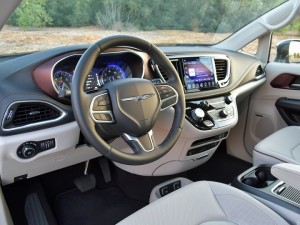
Given that – and the liner-like length and wheelbase – I expected the Pacifica to take corners like the Titanic.
Slow – and wide.
With lots of roll.
Minivans are known for this. You should know the Pacifica’s not like this. It can be tossed around (if you’re into that) without it tossing you around.
The ride and handling are remarkably feng shui.
I particularly liked the way the engineers programmed the Pacifica’s traction/stabilitycontrol to not come on abruptly and frantically. In some other vans, at the first hint of tire squeal, the throttle is cut (by the computer) and the brakes pumped (via the ABS) which is no one’s idea of a good time.
Unusually, the nine-speed transmission doesn’t have “Sport” or “Manual” models. Just Drive and Low (and Park and Reverse). Nothing wrong with this, in my view.
It’s a minivan.
Should a Corvette have 15 juice box holders?
It also doesn’t have a shift lever, as in the Sienna, Odyssey and the other vans.
Instead, gear selection is controlled by a rotary knob mounted on a shelf just to the right of the steering wheel. It’s as simple to use as turning a doorknob and adds an upper class vibe to the package – but it also lacks the tactile feeback you get from a doorknob.
Or a shift lever.
This is however purely personal and subjective.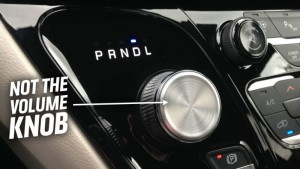
You may like the knob better than the lever.
The Pacifica’s nine-speed automatic, notwithstanding its leverage advantage, is of negligible benefit as far as fuel economy or performance and the nine speed box does more up-and-down shifting, especially on downgrades, with the cruise control engaged and trying to maintain your set speed.
There have been some complaints about this – which Chrysler says it is working to address.
The V6 engine is strong but thirsty.
I averaged just over 20 MPG during my week-long test drive. This is typical; the Sienna and Odyssey suck fuel, too. This is inevitable in 4,300-plus pound (empty) vehicles shaped like bricks. With a family and stuff on board, the curb weight of any of them will be well over 5,000 lbs.
Consider yourself lucky to average just over 20 MPGs in such a fatty.
Minivans started out as appliances. They have become very nice appliances.
Particularly the Pacifica, which is the only minivan sold under a brand label that’s at least entry-luxury.
Not quite Lexus or Acura.
But a cut above Toyota and Honda.
Examples of which include the Pacifica’s available double sunroofs (a large, panorama main section that slides and tilts plus a fixed glass panel at the rear, to provide natural light for the third row occupants), available 20 inch wheels (Sienna and Odyssey max out at 19s) and the individual LCD monitors for the optional entertainment system. These are built into the driver and front seat passenger seat backs, as in high-end luxury cars. Passengers can play games or do whatever while the other passengers do (and watch) what they want to do/watch. 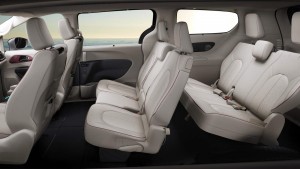
Sienna and Odyssey have a single (drop down) LCD monitor. Everyone watches the same thing.
Pacifica also offers a very elegant-looking (and larger than rivals) 8.4 inch iPad-style LCD touchscreen – standard in Touring L Plus and Limited trims. It’s delicately framed, canted slightly toward the driver.
The problem with all these touchscreens is that there is literally no tactile feedback. It’s a flat screen. Which makes it hard to operate them accurately without looking at them. Particularly while the vehicle is moving. Because your finger is moving with the movement of the vehicle. Tapping/swiping with precision in a moving vehicle while also keeping your eyes on the road is inherently problematic; you have to take your eyes off the road to do it.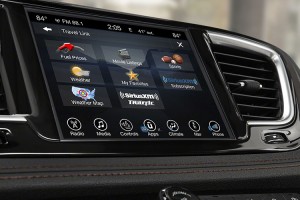
This is tempered in the Pacifica to some extent by conventional (button/knob) secondary controls, including for the AC and audio. These can be operated by feel.
However,if you want to turn on the seat heaters or make other adjustments, you’ve gotta tap/swipe.
And, look.
The Toyota and Honda (and pretty much every new vehicle) have the same issue, because pretty much every new vehicle now has a touchscreen. These flatscreens look good – but whether they’re a good idea is very debatable.
As far as people – and cargo-carrying – capacity:
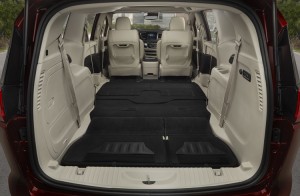
Pacifica’s roomy for people in its first two rows (41.1 inches of legroom up front and 39 inches for the second row passengers). This is about the same as in the Odyssey (40.9 inches in the first and second row) and noticeably more than in Sienna, which has a more abbreviated (37.6 inch) second row.
But – and this is kind of surprising, given the Pacifica’s the longest of the three – it has the least cargo room of the three: 32.3 cubic feet behind the third row and 140.5 cubic feet with the second and third row folded. The Sienna makes up for its somewhat crampy second row with the most cargo room of the bunch: 39.1 cubic feet with all its seats in place and 150 cubes with the seats removed/folded.
The Odyssey slots in between with 38.4 cubic feet behind its third row and 148.5 with everything folded down.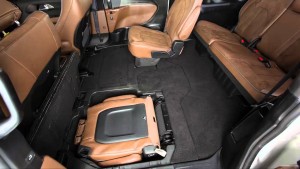
But you may not need the maximum capacity of the Sienna/Odyssey – while the Chrysler’s neat Stow &Go second row (which also tilts forward, easing access to the third row) is a definite draw. It’s also nice that Chrysler offers eight-passenger capacity as a kind of a-la-carte feature. Just buy the removable center seat and there you go.
In the others, you have to buy a higher trim to get eight-passenger capacity. Or – as in the Sienna’s case – the higher trims aren’t available with eight-passenger capacity at all.
THE REST
If you need an Airstream that can haul itself around, you will not be disappointed by any of these (cough) “mini” vans.
They are RVs in all but name, with huge capacity for people and their stuff. Designed for comfortable cross-country travel, including – if you want to – sleeping in them as you go. As soccer-mom-ish as the look (and rep) may be, the layout – low floor height, dual sliding doors and swiveling/reclining captains chairs – have their charms.
The Pacifica’s the newest of the bunch (Honda will update the Odyssey next year) and so has the latest stuff – examples of which include the nicer/larger (and more abundant) touchscreens.
But it’s also the newest of the bunch – without an established reputation. The Honda and Toyota are extremely safe bets, reliability-wise and also depreciation-wise.
On the upside, it is likely – for just this reason – that you’d be able to whittle down the asking price to a much more reasonable price. With the Toyota and Honda, this is often much harder to do – precisely because they have the blue chip rep.
THE BOTTOM LINE
The Pacifica is competitive with the segment leaders. But that may not be enough for Chrysler to snatch back pieces of a market it once owned but which has been taken away one conquest at a time, by rivals like Honda and Toyota, that just did a better job executing the concept Chrysler was first to market with.
Time will tell.
EPautos.com depends on you to keep the wheels turning! The control freaks (Clovers) hate us. Goo-guhl blackballed us.
Will you help us?
Our donate button is here.
If you prefer not to use PayPal, our mailing address is:
EPautos
721 Hummingbird Lane SE
Copper Hill, VA 24079
EPautos stickers – new design, larger and magnetic! – are free to those who send in $10 or more to support the site.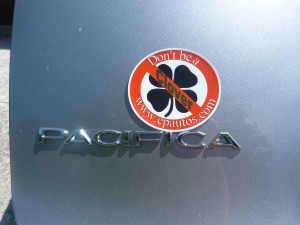


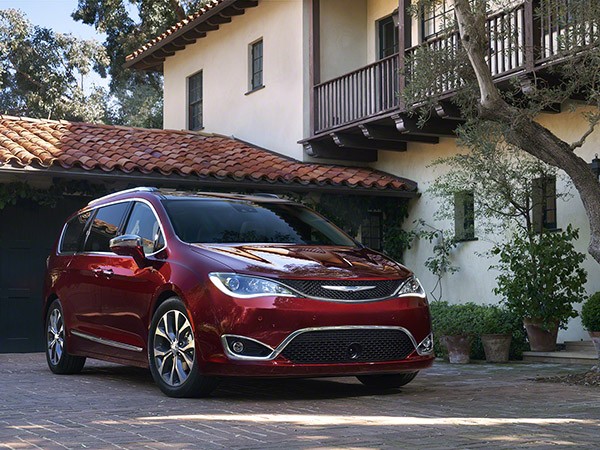

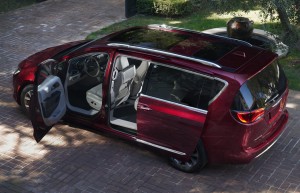
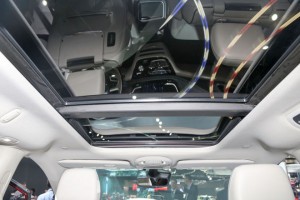

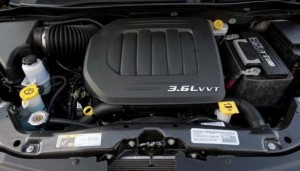
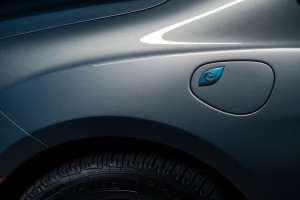
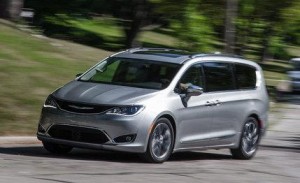
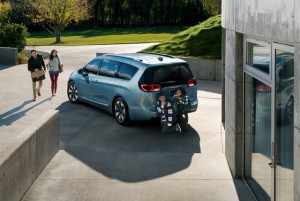
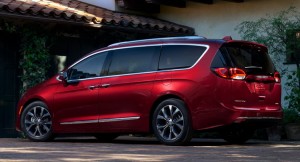
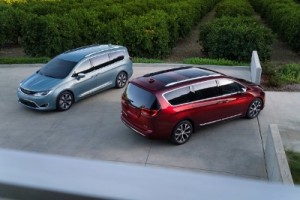







Will there be a Dodge version to replace the Caravan/Grand Caravan?
No, they will continue to make the prior version of the Caravan another model year or so. No more stripped down minivans.
“With low step-in height, even compared to a crossover, and lots of room to waddle around inside, plus a decent bit of headroom, these are ideal senior citizen transports”
Sounds perfect for Hillary, and her heavy set “medical assistant.” 🙂
This worked on Chrome, but not Firefox.
Did you clear the cache?
I had not done that, as I did not know how. But an Edge search showed it.
So now that works, but I have to enter my ‘Name’ and email each time, because ‘no login providers have been enabled.
Hi Phillip,
Very strange… Question: Are you a registered user here? If not, please register and I will update your status; that may fix things…
Yes, I have been registered for some time. And when I open epautos.com, my login appears in the upper left, along with a Log In button, which always worked until yesterday.
Anyway, it’s not too bad, as Firefox has my Login and email memorized, so I only have to enter the 1st letter, then click what pops up.
Yup – just confirmed… I am trying to figure out what’s going on with Chrome… but it’s Google… so god only knows.
This is both Chrome, which I only tried when Mozilla started acting up, and Firefox, my usual ‘ride.’
It’s aggravating. This site has a huge audience; I ought to be able to afford to pay a full-time tech support person to handle things like this – and make the site even better than it is.
But I barely earn enough to keep my own head above the waterline.
Sometimes, I miss the ’90s.
I wasn’t able to write about many things I can now write about without pulling any punches. But I was also earning a not-bad salary and all I had to do was write. I wasn’t also a copy editor, graphic designer, web developer and marketing/advertising executive.
I need a clone.
eric, another riddle. there has been a google.com script running on this site for years but not since you first stopped using Google. It was part of the script package some time later. I notice these things since I use NoScript and NEVER allow google.com. I have yet to find a site that it was necessary except for google.com which I avoid.
After I had close that out the other day and opened another from email, I noticed there was no red dot to denote a blocked script. I looked to see what was blocked and google.com is in the “recently blocked sites”. Why it always had to be blocked and now doesn’t is another head scratcher. Right now NoScript is showing no blocked scripts which is unusual since google.com now doesn’t need to be blocked.
Hi Eight,
Yup. There are many things that need fixing… but I can’t fix them myself. I need tech support. My hope is that one of these days, I’ll be able to afford it!
Nice looking land yacht with huge pillars.
Hate to break it to you, EP, but Fiat-Chrysler is the 800lb gorilla in the minivan garage. Dodge sold 97,141 Grand Caravans and Chrysler sold 93,848 T&Cs in 2015. That’s 191,000 minivans for 2015 using an outdated platform that nobody really liked. By comparison, Honda had a big year, selling 127,736 Odysseys and Toyota sold 137,497 Siennas as well, placing them #2 and #1 respectively. However, in 2014, Chrysler and Dodge individually outsold both Honda and Toyota. Chrysler is synonymous with minivans, probably because they invented them, and even though Honda and Toyota made better versions the past several years, they’re still struggling to keep up with Fiat-Chrysler. The whole market generated about 1/2 million sales in 2015, so F-C had almost 40% of all minivan sales. This is not a small market, and Chrysler needed to do something to maintain their dominance.
By all reviews I’ve seen, the new Pacifica just leapfrogged Honda and Toyota handily. And I’m saying this as one of F-C’s biggest critics and detractors. Though it has the most horsepower, it doesn’t suffer that badly at the pump compared to rivals. Although it doesn’t show in the 0-60 time, I would wager that that extra power would be noticeable when lugging around seven passengers and some luggage in the back.
I hate to admit it, but a hybrid system makes sense in a minivan since the battery system would mostly be used to help acceleration off the line and in stop-and-go traffic, which these things do most of their lives. Though they are ideal long-haul cruisers, they rarely get used for that purpose. Normally they are making school runs, grocery runs, errands around town, and carting kids and their crap to activities like sports and dance and such. Having the electric engine take the edge off the acceleration duties with high-torque off-the-line makes a lot of sense. A diesel makes more sense, but at the same time F-C has no diesel engine approved by the Uncle for US markets that would be suitable for such an implementation, and the current climate around diesel development, again thanks to Uncle, is pretty dark whereas people are wrongly convinced that “hybrids are the future.”
The one area that it is slightly behind the Japanese bruisers is in maximum cargo volume, which has mostly to do with the Stow-and-Go seating. They have to lift the floor a little to provide storage room beneath them to hide the seats. In the competition, you have to physically remove the seats from the vehicle, which is both a time-consuming chore and a back-breaking one. This SnG feature also has the advantage of creating little storage nooks in front of the seats themselves, in the floor. So it’s not a total loss compared to the Japs.
The two markets I see for minivans are the obvious one, young middle-class families, and the not so obvious one, senior citizens. The former are drifting to crossovers, but that only works for smaller families. Anyone with two or more kids quickly discovers a crossover won’t cut it, even a three-row one, since there’s no room behind the third seat for the kids’ crap and there’s no way to transport grandma and grandpa to little Johnny’s game all in one vehicle. It’s sort of a sad commentary on modern consumerist society when you need a friggin school bus to carry you, your spouse, your two kids, and all their toys, snacks, iPads, headphones, etc. all over town. You mention living out of these things and you’re more correct than you realize.
The geriatric market has more to do with the desire for an ease-of-entry interior, lots of comfort and luxury, and room for a wheelchair/walker or three if so needed. With low step-in height, even compared to a crossover, and lots of room to waddle around inside, plus a decent bit of headroom, these are ideal senior citizen transports that have the added benefit of providing them an even larger vehicle with which to terrorize surrounding traffic while traveling 20mph below the posted speed limit.
For all of these, except perhaps the Mazda 5 (which sold a paltry 8,609 units in 2015), the sad thing is that though they have the luxury end of the market covered (these things are plush, even in base trim, and the high end models rival limousines), they do nothing for the actual lower income folks when prices start out in the high $20k range. Even finding a decent deal on a used one can be difficult as these things, at least the Japanese ones, hold their value surprisingly well. There’s always families looking for tribal transport that’s less than 5 years old. It used to be that minivans were inexpensive means to transport 7-8 folks. Now that they’re trying to overcome the bad image, they don’t sell such low-rent models any longer. Plus, safety is expensive. I bet the price of all the airbags alone in one of these things is several thousands of dollars of the price tag.
The biggest problem is that this is a Chrysler product, notorious for their unreliability. Combine that with their now-parent company, Fiat, and that laughable reliability record, and the fact that this is the first year of production, and you may very well be sitting on a ticking time bomb of repair costs. Then look at all the electronics that can (will) go wrong, including a drive-by-wire transmission shifter, and it boggles the mind. At least with the Toyota and Honda you know it’ll still be running after 100,000 miles if you so need it to.
These things are an investment of sorts, expected to do many years of parental service with a minimum of fuss and trouble while the kiddos grow up from rugrats to gym rats and then off to college. Amortize that extra $5k of luxury options over the lifetime of this beast and the added comfort and sanity it provides likely is worth it.
It’s a mad, mad, mad, mad world.
Hey, I don’t know about Fiat, but we had a 97 Caravan and an 03 Grand Caravan. Both went over 200k w/only the trannys as major issues.
There is Talk that Fiat is thinking seriously about bagging it… which would be bad news for Chrysler.
Agreed! Really it’s a mad, mad, mad, and over mad world!
Anyone out there having issues posting comments? I got the following e-mail just a little while ago:
“It is now impossible to post comments on your forum. I get the error message “cookies and javascript are required” Every other site in the world works.”
eric, I got the same thing this morning. I just closed it out and clicked a link from an email and everything worked just fine. Last time I tried to fix it(not long ago)I tried to log out and log back in and got the old You’re banned thing so after fighting it for awhile I just close it out and when I clicked on a link in email it went right through, showed me to be logged in and no big deal. Otherwise, I didn’t have my password due to a new computer(old, new to me)and couldn’t find the old one, always let Mozilla keep it. It wouldn’t let me go in and change passwords(banned, forever) and that’s when I just closed it out and used an email link. No problems till this morning. I just didn’t go in circles this morning. And the phone just rang for me to go take a drug test for a new job. Yeee hawww
Thanks, Eight –
A couple of people have e-mailed me advising they are having similar issues. I have no idea how to even begin to fix this.
And this is why I need tech help.
My login from home is working. But I haven’t restarted the browser today. From work I got the error in two different browsers.
very strange.
We may have been hacked. But there is nothing I can do. Same problem. The site needs a tech support person. But I can’t afford one…
Apparently it is some sort of plugin problem. The solution has something to do with deactivating and reactivating plugins. Also resetting the plugin folder and a couple other things.
https://wordpress.org/support/topic/javascript-and-cookies-are-required-in-order-to-post-a-comment
https://wordpress.org/support/topic/commenting-error-4
https://wordpress.org/support/topic/javascript-cookie-error-when-registration-spam-is-enabled
I think it can be worked through with a little trial and error.
Did you recently add a spam shield plugin?
test test test test
Huh weird, works in chrome but not firefox…………………
Mine works in Safari, but not in Chrome…
Thanks, Yeti… that is interesting.
Chrome being Google…
Works in TOR (Firefox).
I wonder if it’s in my Chrome settings…
I’ll mess around and see if I can find the problem.
I know next to nothing, but: Have you disabled cookies? Apparently, WP requires cookies to function…
Nope. I checked both that and javascript.
This is Chrome as a guest.
Is this thing on?
OK, eric. I reset my Google synch, logged back into the browser and it seems to be working.
Success!
Excellent! Thanks, Yeti… hopefully the others who are having issues will see this…
The wife rented a “full size car” last year to use on a 600 mile round trip. She gets there late enough there’s one vehicle left, a Toyota Big Mama Truckster Van. She left in it and I stopped to fuel up and get a few things. My mind was on something else by the time I got home. When I got to the point in the driveway I could see the front of the house I at first thought it was a local van that hauls people for hire until I realized what it was. We flipped the back hatch up, and I opened all the doors to flip all the seats down since the huge headrests were like trying to look through a full cargo van. Once I got the front seat headrest out of the way it looked huge.
Cue that backup cam, you needed it and I only backed it up to turn it around. She got back and the first thing she said was “boy, was that a drag and did it ever eat the gas”. Of course she was driving it 75-80 the whole way so she called it Slurp. She said it was just too big, didn’t handle worth a damn and you couldn’t see anything, needed some West Coast mirrors.
Next time they had no full size left even though she had one reserved. She got a Dodge 200. This was the only car she’s rented that rated a “Fuck That!” just as soon as she got out. She liked the Altima best mainly because of the knobs on the radio and easy bluetooth for the phone and the mileage was close as was the Malibu. The Ford was one I drove and I liked it fine. I drove the Chevy some and put it right there with the Ford. The Altima’s seat wasn’t big enough for my chest and was really uncomfortable, not a problem with any of the American sedans. Seats in the Ford and Chevy were fairly comfy, about the same but the Dodge I drove 60 miles sat like an apple crate and sounded like a haybaler.
Well, I spoke with the wife and she had two Altima’s and liked them. She didn’t like the Malibu due to not being able to see. She had a Charger she liked ok except for dragging the front spoiler on city streets you could barely tell had a low spot. The Charger the rent people said got 36 mpg and I laughed got about 24 but the 200 got about the same mileage as the charger. When I was driving it I looked back over the last 1500 miles it had been driven and the average mpg was a bit over 24.
I promise you those EPA cycles are not done to represent Texas driving. No car got very close at all to the rating and all the driving was done with the cruise on with virtually no stops. I called bullshit on the EPA tests for everything. I did get in a hurry in the Ford and admit it had plenty 80-90 mph driving and some charges over 100 getting around clovers who tried to block your passing them…….at night……fuckin idiots. Real smart to drive way faster than you obviously were comfortable with to keep someone else from passing you. The only thing I didn’t like about the Ford was a terrible amount of torque steer when you floored it so moving over the center stripe wasn’t smooth in any way.
Oh boy, a Fiat mini van. Wow, a hybrid is coming soon.
As though a minivan can actually travel 30 miles on batteries alone unless the climate is perfect, terrain is always down hill, and filled with helium balloons to counteract the battery tonnage. Give me a break!
Case in point. No one in their right mind wants a battery powered lawn mower that must be charged twice to complete the job, especially not when each charging interval takes longer than actually cutting the grass. Same with driving. But our tax dollars are available for companies to develop and offer such devices even though no market exists for them. Black and Decker probably has one.
Manufacturers must offer hybrid/electric drive trains to offset lousy CAFE numbers, aka carbon credits. Price is unimportant but having them in the lineup is crucial.
Can’t disagree, CC!
The hybrid stuff is truly Don Quixotian…
Maybe they can send you a hybrid pacifica (along with a Chevy Volt) this winter to see how much the cold takes from the range of the battery.
Hi Rich,
Glad to see you can post! Do you have any idea what the issue was?
Have no idea, can only post with Chrome, Firefox even after clearing cookies and cache still doesn’t work…………
Hi Rich,
I’ll get one for certain – but probably not before next spring.
However, I have driven several plug-ins during cold weather and I typically get about 10 miles out of them before the charge depletes. The technology is certainly interesting (like hydrogen fuel cells) but does it make any kind of economic sense?
Not that I can see…
Here you go. http://www.popularmechanics.com/home/tools/reviews/g122/we-test-the-best-battery-powered-lawnmowers/
Slightly better than I thought, one mower was “rated” as handling 1/4 acre on one charge. Maybe it has a solar array to supplement the battery. I’m not giving up my Gravely just yet.
When I was a kid we had an electric lawn mower. Not a battery, but one with a cord to a plug. What a piece of crap it was and yup it was a black and decker. It was so slow too. When I finally got the folks to buy a gas mower, I cut the lawn cutting time from 45 minutes to just 10 minutes. Yes, it was that pathetic.
Evidently my brother must not have had to mow very often. He bought a battery mower for his yard, and it can’t even cut half of his lawn at a time, and yes, his yard isn’t that big.
My dad bought an electric lawn mower in the 50’s. We didn’t have a lawn per se’, just the battle field left over from previously being the edge of a plowed field with some old pens that had been torn down. I can guarantee it never had the proper size of cord but it would cut crap our neighbors mowers would bog on and die. Everybody had a few gas lawn mowers while this one literally leveled the lots over a period of years slinging rocks and big clouds of dirt and ground up weeds like there was no tomorrow. Maintenance? Like everything else we had, it simply got used. We took it to a new house where it got to go through that same thing with our battlefied left from building and weeds that could get higher than your head before it got dry enough to push one through it.
Everybody around us there bought a new gas mower ever few years and that electric job kept on going. After a good dozen or more years of use it began to growl and get hot. No new brushed, rarely new blades and never a good cleaning. We got a new one and it didn’t last nearly as long so my dad has so much lawn by this time that he bought a riding mower. It did pretty well but didn’t even come close to lasting as long as an electric. He got another mower, a Sears, and it was a POS(cheap MTD) his last one he bought was another cheap MTD Craftsman, not a good investment. We bought a John Deere in ’86, paid $3500 for it and the engine never used a drop of oil(single cylinder Kaw)and the deck finally got eaten up by sand and I’d weld new steel on the outside. It finally had one bearing go out, no big deal. We mowed in shifts with it and it ran 15 hrs a day some days. Had a hydrostatic transmission that didn’t seem to even need anything. It lasted a good 15-20 years until it was stolen, still running great. Don’t think a new JD will do that though. Almost every mower is made by MTD to whatever specs desired and they range greatly in quality.
A friend bought a new $7000 mower 10 or more years ago, had an industrial engine, hydraulic powered blades, 3 gearboxes and two wings. It’ll cut virtually anything. Wish I’d had the money to buy one. We cut several acres and shred several more. We have the organic mowers turned in around the house now and they keep things mowed pretty well. We should have left them in first thing in the spring and we wouldn’t have all the ragweed we have now.
‘organic mowers’ – yea, we have those too, but we’ve cut back on sheep and the ones remaining are not keeping up w/it. Not enough graze for a steer. We may get a couple of pigs next spring.